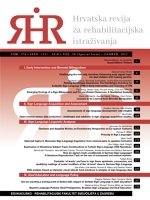Open Science versus Data Protection – Challenges and Solutions in Sign Language Acquisition Studies
Open Science versus Data Protection – Challenges and Solutions in Sign Language Acquisition Studies
Author(s): Vera KolbeSubject(s): Language acquisition, Inclusive Education / Inclusion
Published by: Sveučilište u Zagrebu, Edukacijsko-rehabilitacijski fakultet
Keywords: open science; data protection; sign language acquisition studies; research data processing; sign language research ethics;
Summary/Abstract: Research within Deaf communities needs to adhere to the ethical requests of the partner communities involved. These ethical requests can be met via open science practices that are implemented in the project strategies of the European Commission. Open science refers to transparent, collaborative, and accessible research including citizen science. However, researchers studying the acquisition of sign languages are challenged by the General Data Protection Regulation implemented by the European Parliament. Researchers who study sign languages frequently handle personal data, i.e. video data. Such data cannot be fully pseudonymised since facial expressions contain relevant linguistic inputs and cannot be blurred. Hence, strict data protection measures are necessary, but these measures are contradictory to open science practices. How can we meet the demands of the data protection regulations, as well as enable open science practices. This article identifies strategies used in a sign language acquisition study involving more than 100 sign language videos of children’s narrations, which was conducted at the Department of Sign Language Pedagogy and Audio Pedagogy, Humboldt-Universität zu Berlin, Germany.
Journal: Hrvatska revija za rehabilitacijska istraživanja
- Issue Year: 58/2022
- Issue No: Spec. Iss.
- Page Range: 109-120
- Page Count: 12
- Language: English

